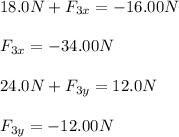
Physics, 11.06.2020 23:57 jholland03
A 2 kg object is subjected to three forces that give it an acceleration −→a = −(8.00m/s^2)ˆi + (6.00m/s^2)ˆj. If two of the three forces, are −→F1 = (30.0N)ˆi + (16.0N)ˆj and −→F2 = −(12.0N)ˆi + (8.00N)ˆj, find the third force.

Answers: 3


Another question on Physics


Physics, 21.06.2019 22:40
Ablock of mass m = 2.5 kg is attached to a spring with spring constant k = 710 n/m. it is initially at rest on an inclined plane that is at an angle of θ = 23° with respect to the horizontal, and the coefficient of kinetic friction between the block and the plane is μk = 0.19. in the initial position, where the spring is compressed by a distance of d = 0.16 m, the mass is at its lowest position and the spring is compressed the maximum amount. take the initial gravitational energy of the block as zero. a) what is the block's initial mechanical energy? b) if the spring pushes the block up the incline, what distance, l, in meters will the block travel before coming to rest? the spring remains attached to both the block and the fixed wall throughout its motion.
Answers: 3

Physics, 22.06.2019 08:00
5g of ammonium nitrate was dissolved in 60g of water in an insulated container. the temperature at the start of the reaction was 23.0°c and at the end it was 19.0°c. calculate the energy absorbed by the reaction.
Answers: 3

Physics, 22.06.2019 16:30
When conducting an investigation to determine which type of fertilizer produces the most flowers on a plant, which variable would be graphed on the x-axis once you collected the data? a. type of fertilizer b. amount of flowers c. amount of water d. number of days that the plants grew
Answers: 1
You know the right answer?
A 2 kg object is subjected to three forces that give it an acceleration −→a = −(8.00m/s^2)ˆi + (6.00...
Questions




Mathematics, 02.08.2019 03:00

Health, 02.08.2019 03:00



Mathematics, 02.08.2019 03:00




Social Studies, 02.08.2019 03:00

Biology, 02.08.2019 03:00

Social Studies, 02.08.2019 03:00






English, 02.08.2019 03:00



![\vec{F_1}+\vec{F_2}+\vec{F_3}=m\vec{a}\\\\(30.0-12.0+F_{3x})N\hat{i}+(16.0+8.00+F_{3y})N\hat{j}=(2.0kg)[(-8.00m/s^2)\hat{i}+(6.00m/s^2)\hat{j}]\\\\(18.0+F_{3x})N\hat{i}+(24.0+F_{3y})\hat{j}=(-16.00N)\hat{i}+(12.0N)\hat{j}](/tpl/images/0683/5142/82eae.png)



